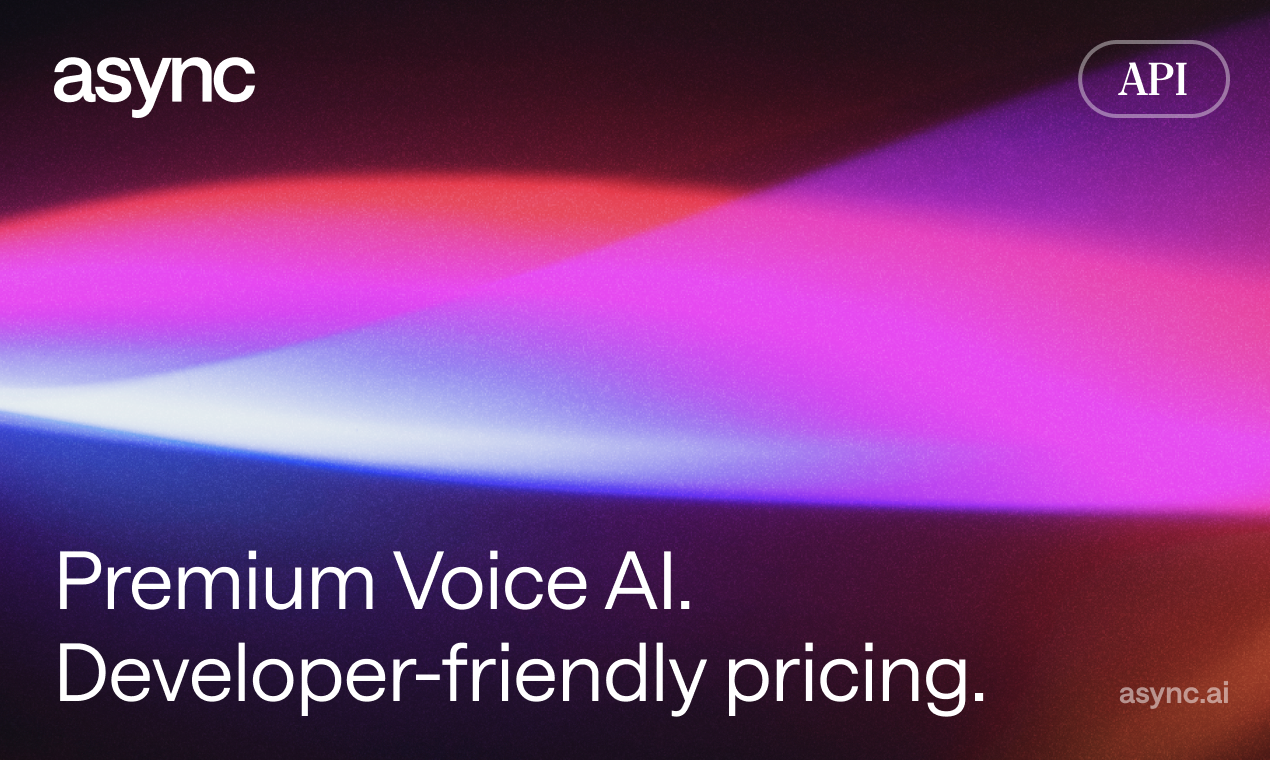Table of Contents
Overview
In the ever-evolving landscape of AI, voice synthesis has become increasingly sophisticated. Async Voice AI emerges as a premium solution, offering developers the ability to integrate remarkably lifelike and expressive AI voices into their applications. If you’re looking to add a human touch to your digital interfaces, Async Voice AI might just be the tool you need. Let’s delve into what makes it stand out.
Key Features
Async Voice AI boasts a range of features designed to deliver exceptional voice synthesis:
- Realistic Voice Synthesis: At its core, Async Voice AI excels at creating voices that sound incredibly human, minimizing the robotic tones often associated with AI.
- High Emotional Fidelity: This feature allows the AI to convey a range of emotions, adding depth and nuance to the synthesized speech.
- Developer-Friendly API: The API is designed for easy integration, allowing developers to quickly incorporate Async Voice AI into their existing projects.
- Custom Voice Creation: Tailor the voice to your specific needs by creating custom voices that align with your brand or application using just 3 seconds of audio sample.
- Fast Response Times: Experience minimal latency with ultra-low response times under 200ms, ensuring a smooth and responsive user experience.
- Supports Multiple Use Cases and Languages: Async Voice AI is versatile, catering to various applications and supporting 20+ languages for global reach.
- Instant Voice Cloning: Create realistic voice clones from just 3 seconds of audio, capturing tone, pronunciation, and emotion with remarkable accuracy.
- Streaming Capabilities: Real-time audio streaming for immediate playback and responsive applications.
How It Works
Integrating Async Voice AI into your application is a straightforward process. Developers use the API by sending HTTP requests containing the text they want to synthesize, along with any desired parameters such as voice ID, output format, and sample rate. The system then leverages the advanced asyncFlow v1.0 neural model to analyze the text and generate audio that replicates human-like speech characteristics, including intonation, emotional inflections, and natural pronunciation. The synthesized voice audio is then returned to the application via streaming endpoints for immediate use.
Use Cases
Async Voice AI opens up a wide array of possibilities across various industries:
- Voice Assistants: Enhance the naturalness and expressiveness of virtual assistants, making interactions more engaging and human-like.
- Audiobook Narration: Create compelling audiobooks with AI voices that capture the emotion and tone of the story.
- In-App Voice Features: Integrate voice prompts, tutorials, and feedback within applications to improve user experience.
- Customer Support Automation: Automate customer support interactions with AI voices that sound friendly and empathetic.
- Game Character Voices: Bring game characters to life with unique and expressive AI voices.
- Accessibility Solutions: Provide voice-based accessibility solutions for users with visual impairments or reading difficulties.
- Digital Marketing: Boost engagement metrics with attention-grabbing voice content for advertisements and promotional materials.
- Healthcare Communication: Build trust through clear, empathetic voice interactions in healthcare applications.
- Digital Humans and AI Avatars: Power lifelike virtual representatives for brands and services.
Pros \& Cons
Like any technology, Async Voice AI has its strengths and weaknesses.
Advantages
- Extremely lifelike speech quality that rivals human recordings with broadcast-quality output.
- Easy API integration simplifies the development process with developer-first philosophy.
- Fast generation times with ultra-low latency under 200ms ensure quick turnaround.
- Supports a wide emotional range, adding depth to the synthesized voice with advanced emotional inflection capabilities.
- Competitive pricing starting at \$1 per hour with transparent, straightforward pricing model.
- Unlimited voice cloning capability on pay-as-you-go plans.
- Extensive voice library with 1000+ voices available.
- Comprehensive language support with 20+ languages.
Disadvantages
- API access incurs costs after the free hour, depending on usage volume.
- Requires a stable internet connection for operation as a cloud-based service.
- Voice customization options may be more limited compared to some specialized competitors.
- Relatively new service with limited long-term performance track record compared to established competitors.
How Does It Compare?
When comparing Async Voice AI to its competitors, it’s important to consider specific needs and priorities. WellSaid Labs offers strong voice quality but is significantly more expensive, starting at \$49 per month compared to Async’s \$1 per hour pay-as-you-go model. Contrary to initial assessment, Async Voice AI actually provides a larger voice library with 1000+ voices compared to Play.ht’s 907 voices, while both services emphasize emotional expression and natural speech quality. ElevenLabs, while offering premium voices, charges \$5 per hour and \$0.25 per voice clone, making Async more cost-effective for developers with unlimited cloning needs. Async Voice AI strikes an excellent balance between quality, expressiveness, cost-effectiveness, and ease of use.
Pricing
- Free Plan: 1 hour of free credits to get started
- Pay-as-you-go: Starting at \$1 per hour for text-to-speech
- Custom Plans: Flexible pricing for enterprise teams with volume discounts
- Voice Cloning: Unlimited on pay-as-you-go plans (no per-clone fees)
- Additional Features: 5 parallel requests, streaming capabilities, technical support
Final Thoughts
Async Voice AI presents a compelling solution for developers seeking to integrate realistic and expressive AI voices into their applications. Backed by Podcastle’s years of experience in audio technology and powered by the proprietary asyncFlow v1.0 model, it offers exceptional value with its competitive pricing, extensive voice library, and developer-friendly approach. While it has a few limitations as a cloud-based service, its strengths in voice quality, emotional fidelity, cost-effectiveness, and ease of use make it a strong contender in the voice synthesis market. With features like instant voice cloning, ultra-low latency, and transparent pricing, Async Voice AI is particularly well-suited for developers who prioritize both quality and affordability in their voice AI implementation.
